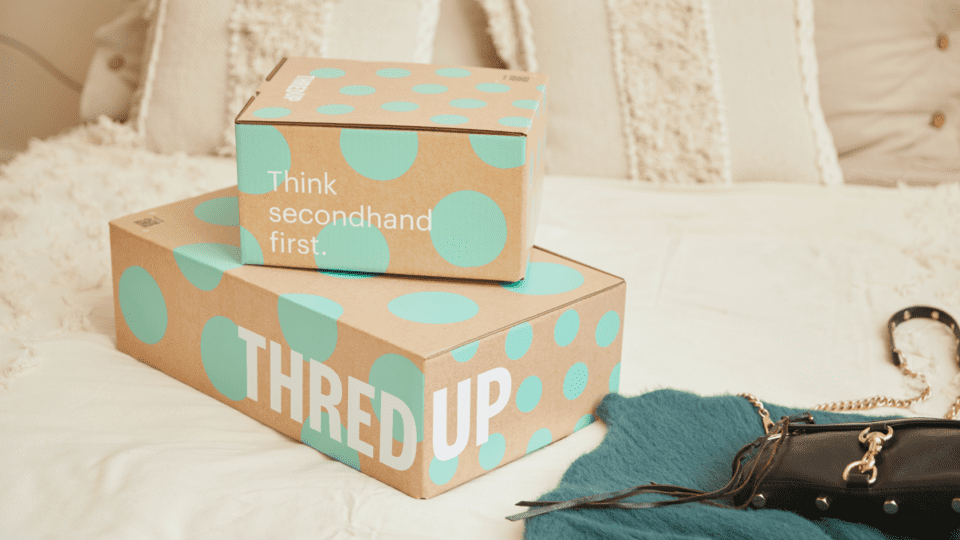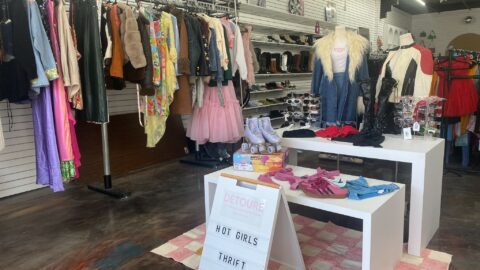Marking a significant shift in ThredUp’s value proposition to consumers, the resale marketplace testing out a number of new initiatives to improve its margins, including new return policies and fees for its “cleanout kit” consignment services.
ThredUp has quietly rolled out these changes in what CEO James Reinhart called “a meaty experiment” to optimize its unit economics by making “real-time adjustments to both the supply and demand sides of our business.” Reinhart said the company hopes to reach adjusted EBITDA break-even by the back half of 2023.
ThredUp beat expectations for Q4 2022 but still saw revenues decrease 2% year-over-year, to $71.3 million, which the company attributed to the wider pullback in consumer discretionary spending as well as an influx of discounted product from other retailers during the holiday season.
“While we don’t face the same inventory risks as traditional retailers due to our consignment model and flexible supply chain, we believe we were affected by this influx of cheaply priced clothing,” said Reinhart on the company’s Q4 2022 earnings call. “The ThredUp brand stands for value and that message was being washed out in this hyper-promotional landscape. We saw many of our core shoppers sitting on the sidelines, and for those that were in market, the resale value proposition was diluted relative to the exceptional bargains being offered for new clothing.”
Advertisement
However, Reinhart said he is “cautiously optimistic for resale in 2023” and is positioning the company to move from playing defense to offense as these “competitive dynamics normalize.”
Among those offensive plays is a trial of new fees for ThredUp’s cleanout service, which was previously free. Sellers now have the choice to download a free label and ship the items they want to sell in their own packaging, or pay $2.99 to receive one of the brand’s iconic polka dot cleanout bags. Either way, sellers also will pay a $14.99 fee for the processing of the items they send in, with the option to pay $22.99 for expedited three-week processing.
“Demand for our cleanout service has never really waned, so we’re looking for ways we can prioritize our best sellers and also monetize the brand equity that we built at ThredUP as being the most convenient place to clean out your closet,” said Reinhart. “We’ve been testing fees at different price points and also, similarly, with paying for the cleanout bag. I have to say, we feel very good about the test results. We’re seeing consumers really understand why we’re making some of these changes.”
In addition to offsetting the cost of shipping and processing, Reinhart said that the new fee structure is driving some beneficial changes among sellers. They are sending in fewer bags, filling those bags up more and including higher quality items, all of which Reinhart attributed to the shift in mindset “when people are paying for a service.”
Regular processing of a cleanout kit can still take more than eight weeks, but the company is on track to reach its goal of a four-week turnaround time by mid-September 2023.That’s thanks in large part to the opening of its new Dallas processing facility, which has increased its network-wide storage capacity from 6.5 million items to 9 million items. “As we process bags in real time, we can better scope on the mix of seasonal goods we put online and increase buyer engagement, purchase frequency and satisfaction,” added Reinhart.
Now that the Dallas facility is open, ThredUp also will be able to significantly reduce its CapEx spending in 2023, by approximately 60% compared to last year, which also will help the company’s ambitions to reach break-even this year.
ThredUp also highlighted the continued expansion of its resale-as-a-service (RaaS) offering for brands and retailers, which now provides a large supply of non-consignment, or “owned,” products to its marketplace. The ThredUp RaaS roster now includes 42 clients; new retailers that have joined this year include J.Crew, Kate Spade and Francesca’s.
Finally, Reinhart briefly mentioned that the company was also experimenting with how it managed returns. In addition to increasing the “restocking fee” for returnable items from $1.99 to $3.99, he said the company was also trialing things such as limitations on many products can be returned in order to figure out the best way to make the unit economics work.









